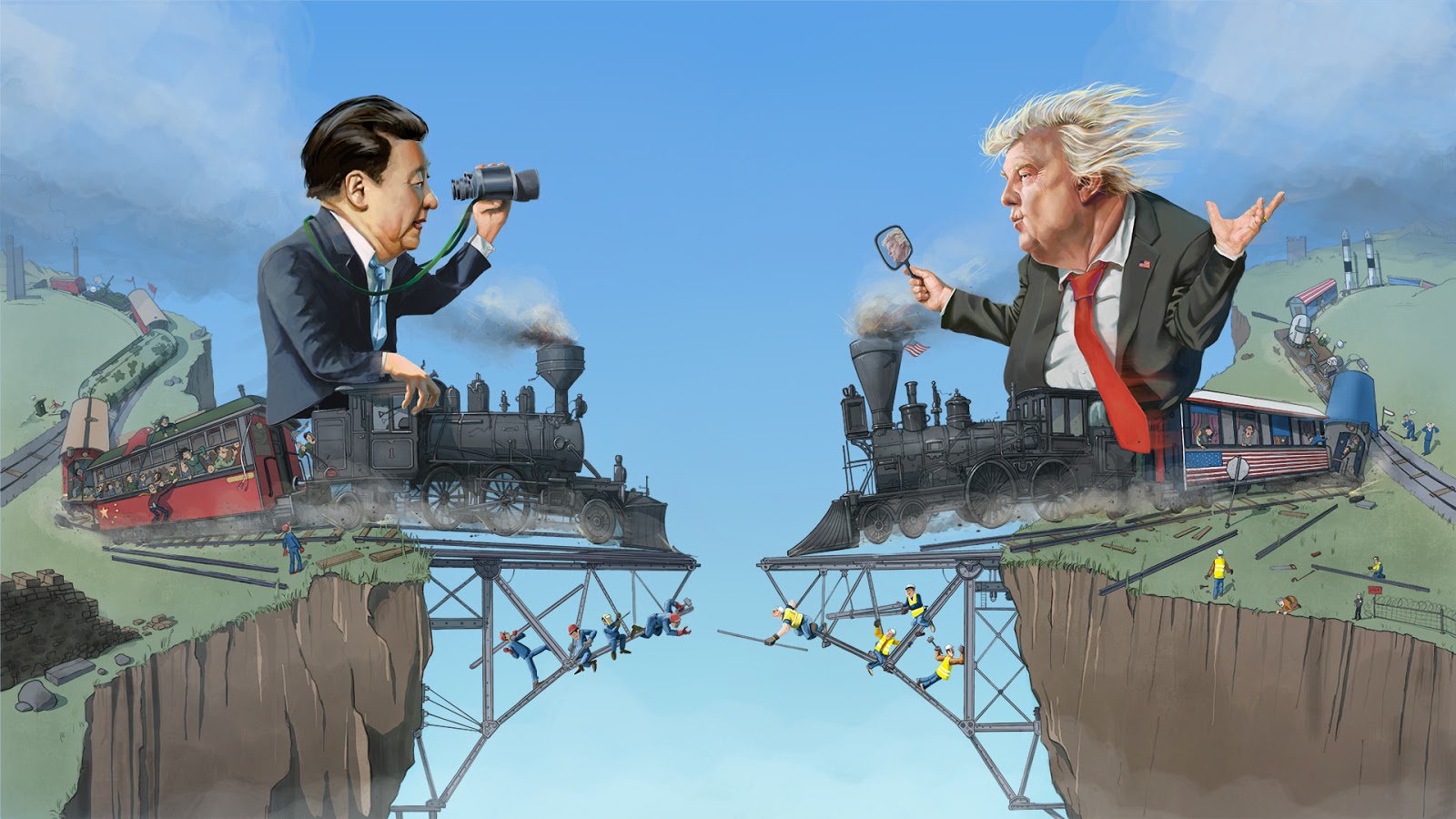Empathy, China, and the future: The China Project year in review
The trajectory of the U.S.-China relationship is the most important human-controlled variable in the equation that determines the ultimate outcome of humanity. The onus to understand “the other” does not fall to just “us” or just “them” — we are irrevocably in this together by circumstance of birth on the same planet at this exact point in time. It's why we at The China Project do what we do to help increase mutual understanding.

COVID → global empathy
The coronavirus changed the meaning of “globalization.” It is no longer just about the origin of the components in our electronic devices, the complexity of our food supply chains, the reach of our home videos via social media, and the choices we had if we were fortunate enough to consider a vacation abroad. In 2020, our interconnectedness became a matter of daily life — and life or death — amid the contagion and disruption of the COVID-19 pandemic.
But the long-term effects of 2020 need not be all bad. Maybe the abrupt destruction of societal and commercial norms will foster a new empathy. Many of us have felt newly lonely and distant from friends and family — but many people were lonely before the pandemic. Many people lost their jobs or their certainty about the future — but large parts of all societies have struggled with economic hardship for as long as they can remember. Many of us in the U.S. have felt shock and disgust at various political twistings and turnings in our country for the first time in a long time — but this is the way marginalized segments of our own society have felt for generations.
It can rightly be said that the rich got richer and the poor got poorer, but no one got through 2020 without great uncertainty and new challenges.
Maybe it is equally true that anyone anywhere in the world — from rich to poor — can relate to one another on a slightly-closer-to-parity basis than before the pandemic. CEOs and back-office and warehouse workers in their companies have all had to contend with their kids being home, albeit with different amounts of resources and support to help them adjust.
Indeed, more — and more prominent — voices in positions of power are calling for reforms to the current economic order and social contract than ever before, out of awareness and empathy for the struggle faced by those not in power.
Maybe the globally shared experience of the COVID crisis puts us on better footing to truly lock arms together against climate change and other global challenges we are facing.
Can I empathize with China?
How many people in the United States or Europe can empathize with the average citizen of the People’s Republic of China? Other than knowing that their economy is really big and their government is really different, how many people in Florida or the Netherlands know what life is like for mainstream Chinese society, or what their internet is chattering about today or what national histories they are coming out of and what they want for the future? What’s it like to have been a subsistence farmer in 1986 and now be a senior engineering manager in a factory that manufactures 82% of the world’s electric blankets? What’s it like to have worked in forced labor camps in the Chinese countryside in 1970 and now run a global private equity fund?
Conversely, how many middle-class Chinese people can possibly understand how in America it is possible to buy a rifle at Walmart, a bag of marijuana at a deli, and a device that lets you detect police speed test radars on Amazon, as well as publish a video blog about how much you hate your president on a Chinese-owned short-video app that said president himself has been unable to block despite the most forceful and public efforts to do so, because “his own” court system overruled the plan?
How many farmers in the Chinese countryside would guess that some Americans still face similar challenges to accessing high-speed internet and reliable healthcare?
And The China Project
The China Project exists to chip away at the gap in understanding and empathy between China and the world. You may think that this objective is a delusion of grandeur or self-importance, and to be sure, there are days — even weeks — when it feels like we’re shooting bullets at a train.
But I’ll say it again, however delusional or cheesy it may seem: The China Project exists to chip away at — in whatever way we can — the gap in empathy between China and the world.
Why do we want to do this? Simply put, the trajectory of the U.S.-China relationship is the most important human-controlled variable in the equation that determines the ultimate outcome of humanity.
Sure, a supervolcano could erupt tomorrow or aliens — or a virus — wipe us out in a few weeks’ time. But provided human civilization continues on without undue exogenous shock, how the U.S. and China handle each other and how they jointly handle shared, global crises will determine our collective endgame.
And before I go any further, let me stop to say that we know it’s not so simple as “fostering understanding,” getting Xi, Biden, and Putin together to sing “Kumbaya,” and going back to the simpler times of yesteryear.
The beliefs, practices, and policies of the Chinese Communist Party make it hard to be friends with them, or to even want to be friends with them. If you polled the The China Project team and our network of contributing writers, you’d find that most of us probably think that the CCP under Xi is leading the country in the wrong direction.
But the road is two-way, and most of the current geopolitical chessboard is the direct or indirect result of America’s decisions or lack of decisions. There is almost no one left of any political persuasion who could argue that the U.S. is unequivocally heading in the right direction — that would require there to be a clear direction.
The onus to understand “the other” does not fall to just “us” or just “them” — we are irrevocably in this together by circumstance of birth on the same planet at this exact point in time.
Cases in point:
- Climate change is not fake news. Be it anthropocentric or not, it’s happening, and it will upend national borders, economies, health systems, supplies of food and energy, and more. Can you imagine a remotely functional response to climate change without earnest and sustained collaboration between the U.S. and China?
- Artificial intelligence, quantum computing, and overall technological advancement — no one really knows what it all will mean in the long run. Will it replace/kill us or simply free up our time for painting and chess? Unless the U.S. and China escape from the worst quadrants of a game-theoretic standoff, we will probably unleash so much damage on each other that we’ll never even find out what the technology could have been used for.
I could go on, but you get the picture.
So day by day, we publish articles, hold (previously live, but now) digital events, produce podcasts, send email newsletters, and connect people and companies in the quixotic but genuine quest to nudge, however imperceptibly, the course of history toward something we all might want.
And to be sure, if you talk to people in Omaha, Wuhan, Addis Ababa, São Paulo, or Vladivostok — we all want the same things.
To that end, in the past year, we have:
- Published 2,098 articles written by 127 people and read by 1.8 million people
- Hosted 39 events with 208 speakers that were attended by 5,038 people
- Released 252 podcast episodes that were downloaded more than 2.1 million times
- Sent 3.5 million email newsletters
- Employed 12 full-time individuals and dozens of freelancers — all just human beings trying to make their way
You may believe that what we are trying to do is important. You may hate China and therefore think what we’re doing is a waste of time — or even somehow wrong or bad. Maybe you like the idea, but you just hate our name. Those are all understandable positions to take. We get you.
But if you do believe that we are making any form of positive contribution to the world and that the fight for mutual understanding is worth fighting — then please consider supporting our work by becoming a subscriber today, or by making an even larger donation to us to support our mission. All donations will be 1:1 matched by a non-profit grant from our sister organization, the non-profit Serica Initiative.






